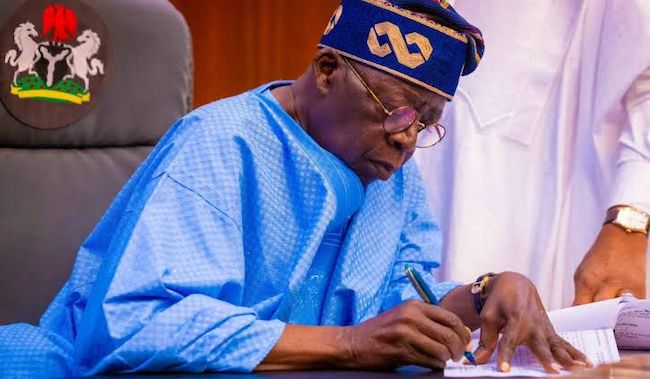
“I hereby flag off the Renewed Hope conditional cash transfer programme for 15 million households targeted at uplifting poor and vulnerable Nigerians as an immediate intervention to cushion the effects of fuel subsidy removal and other economic shocks,” Tinubu told guests and international partners who converged on the Press Gallery of the State House, Abuja.
The conditional cash transfer is one of 15 items in the Memorandum of Understanding between the Federal Government and the Organised Labour on October 2, 2023.
The PUNCH reports that Labour had scheduled Tuesday, October 3, as the first day of its indefinite nationwide strike to protest what it called the government’s refusal to “meaningfully engage and reach agreements” with it on the consequences of the hike in petrol pump price “which has unleashed massive suffering on Nigeria workers and masses.”
“It’s going to be a total shutdown…until the government meets the demand of Nigerian workers, and in fact Nigerian masses,” the union leaders affirmed in a joint statement dated September 26, 2023.
Following the MoU signed on October 2, Labour suspended its plan for 30 days, promising to revisit it if the FG fails to implement the immediate parts of the agreement within 30 days.
Speaking on Tuesday, which is also the International Day for the Eradication of Poverty, Tinubu, who was represented by the Secretary to the Government of the Federation, George Akume, said his administration is “partnering with the World Bank Group and other development partners to implement conditional cash transfers, business grants and other forms of support for the most vulnerable households via the National social safety net expansion programme.”
He continued, “The theme of this year’s commemoration, Decent Work and Social Protection: Putting dignity in practice for all, is no doubt in perfect alignment with the Renewed Hope agenda.
“My government will lead from the front in seeking to ensure that all Nigerians have opportunities decent for dignified work and sustained social protection.”
However, he said the government is working to develop and deploy several more solutions and interventions to help Nigerians of all walks of life.
These include an investment of N100bn to purchase 3,000 units of 20-seater Compressed Natural Gas-powered buses for cheaper transportation; an investment of N200bn to cultivate 500,000 hectares of farmland to improve food security; the release of 2000 metric tons of grains from the strategic grain reserves to households across the 36 States and the Federal Capital Territory and the distribution of 225,000 metric tons of fertiliser and seedlings to farmers committed to the nation’s food security.
Others are the release of 75 billion to support 100,000 SMEs and start-ups, Renewed Hope Shelter Programme for the Poor, Refugees & Internally Displaced Persons targeted at one million households and Renewed Hope Business Grants & Loans for Vulnerable Market women, farmers, and traders to expand their business targeted at two million beneficiaries, among others.
The Minister of Humanitarian Affairs and Poverty Alleviation, Dr Betta Edu, said 61 million Nigerians stand to benefit from the scheme every month in October, November and December.
She said, “So in total, 15 million households will be receiving 75,000 Naira over three months. This equates to about 61 million Nigerians directly benefiting from the conditional cash transfer.
“Why do we call it conditional cash transfer? And what really can it do for Nigerians? If we are sincere with ourselves and as a country, we all must put our hands together to make progress.
“We must recognise the fact that indeed there is a need for that urgent intervention to Nigerians Nigerians need to feel the renewed hope agenda 75,000 Naira.”
Edu said beyond the cash transfers, the FG will provide “low-cost shelter for the poor and internally displaced persons as a form of providing that cover for them.
“Several other interventions, including the Rural Vocational Skills Intervention, will be carried out at mass scale.
“All of these are targeted at the various dimensions of poverty in the country.”
Nigeria’s Minister of Finance and Coordinating Minister of Economy, Mr Wale Edun, said the 63 per cent statistics of Nigerians living in poverty is unacceptable to President Tinubu.
“Clearly, to Mr. President, it is totally unacceptable as it is to the rest of us. And that is why it is perhaps his number one priority, tackling poverty and he has a program to stabilize the economy and grow it in general,” said Edun.
Meanwhile, the World Bank country representative, Shubham Chaudhuri, confirmed that cash transfers are widely applicable to reducing poverty.
Chaudhuri noted that the method is one of the most effective in assisting citizens, particularly the impoverished and vulnerable, who have been impacted by economic shocks or rising living costs.
“This aid is crucial in helping them overcome the initial period during which they might otherwise be compelled to make decisions with long-term consequences.
“For instance, these decisions might include reducing daily meals to just one or withdrawing their children from school.
“The type of cash transfer referred to as ‘shock-responsive cash transfer’ that is currently being implemented is utilized by countries worldwide to offer temporary relief in such situations.”
Afterward, the President presented dummy cheques of N25,000 each to five beneficiaries: Larai Suleiman, Shuaibu Hassana, Sariki Gamu, Okor Jonah and Hameed Kosemani Isiaka.





